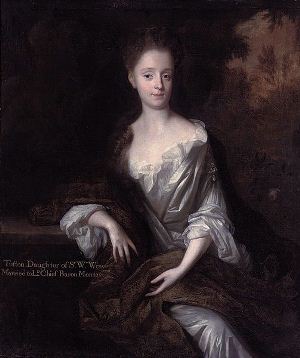Sir James Montagu
1666-1723
Sir James Montagu, politician and judge, was born on 2 February 1666, the seventh (but fifth surviving) son of the Hon. George Montagu of Horton, Northamptonshire, and his wife, Elizabeth, daughter of Sir Anthony Irby of Whaplode, Lincolnshire. Montagu's father was half-brother to the second earl of Manchester, the parliamentarian general. After being admitted to Trinity, and the Middle Temple in 1683, Montagu chose the law as his profession, being called to the bar in 1689. In 1698 he proceeded MA at Cambridge.
 His first official post, in 1694, was as secretary to his elder brother Charles Montagu, earl of Halifax, then chancellor of the exchequer. In 1694 he married Tufton, daughter of Sir William Wray, first baronet, of Ashby, Lincolnshire. The following year he was elected to parliament for Tregony. Not surprisingly he followed the lead of his brother, becoming a loyal supporter of the whig junto. Clearly an able lawyer, he was counsel of Cambridge University by 1698, and chief justice of Ely the same year. After losing the 1698 election he soon returned to the Commons at a by-election for Bere Alston, but was unable to find a seat in 1701. However, Montagu proved just as useful to the whigs outside the Commons, his legal talents being put to good use in the defence of the party cause. In November 1701 he acted for the Kentish petitioner David Polhill in the court of king's bench, and in 1704 he successfully defended John Tutchin for a libel published in The Observator. More famously, he was committed to the custody of the serjeant-at-arms of the Commons on 26 February 1705 for committing a breach of privilege in acting for the Aylesbury men in the Ashby v. White case.
His first official post, in 1694, was as secretary to his elder brother Charles Montagu, earl of Halifax, then chancellor of the exchequer. In 1694 he married Tufton, daughter of Sir William Wray, first baronet, of Ashby, Lincolnshire. The following year he was elected to parliament for Tregony. Not surprisingly he followed the lead of his brother, becoming a loyal supporter of the whig junto. Clearly an able lawyer, he was counsel of Cambridge University by 1698, and chief justice of Ely the same year. After losing the 1698 election he soon returned to the Commons at a by-election for Bere Alston, but was unable to find a seat in 1701. However, Montagu proved just as useful to the whigs outside the Commons, his legal talents being put to good use in the defence of the party cause. In November 1701 he acted for the Kentish petitioner David Polhill in the court of king's bench, and in 1704 he successfully defended John Tutchin for a libel published in The Observator. More famously, he was committed to the custody of the serjeant-at-arms of the Commons on 26 February 1705 for committing a breach of privilege in acting for the Aylesbury men in the Ashby v. White case.
With the revival of whig fortunes in 1705 Montagu re-emerged into favour, receiving a knighthood in April when the queen visited Cambridge University. The following month he re-entered the Commons for Carlisle, and on 5 November became a QC. On 25 April 1707 Montagu was appointed solicitor-general, and promoted to attorney-general on 21 October 1708. As such he opened the case against Dr Sacheverell on 27 February 1710. When the tories returned to power later in 1710 he was compensated for the loss of his office with a royal pension of £1000 p.a. He retained his seat in parliament, continued to support the whigs, and contributed to Kit-Cat Club activities. After his wife died in 1712 he married, on 6 October 1713, Lady Elizabeth Montagu, the daughter of Robert, third earl of Manchester. They had a son, Charles Montagu, later MP for St Albans.
On the Hanoverian succession Montagu was made a baron of the exchequer (20 November 1714), being used in April and May 1718 as a stopgap commissioner of the privy seal following the resignation of Lord Chancellor Cowper. On 8 May 1722 he was advanced to the position of chief baron of the exchequer, which he held until his death on 30 October 1723 at Lincoln's Inn Fields, London.
DNB
James MontaguShield located above the stalls on the south side of the Chapel |
|
|
|
PREVIOUS SHIELD |
|
NEXT SHIELD John Montagu |
| Shield Gallery | Sculpture Gallery |
Brass Gallery | Statue Gallery | Interment &Tombstone Gallery | War Memorial Gallery |
